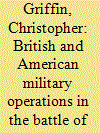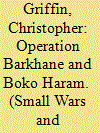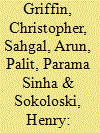|
|
|
Sort Order |
|
|
|
Items / Page
|
|
|
|
|
|
|
| Srl | Item |
| 1 |
ID:
120458


|
|
|
|
|
| Publication |
2013.
|
| Summary/Abstract |
In summer 2006, elements of the British Army were deployed to Helmand province in southern Afghanistan. The US Army followed with a surge in 2009 and 2010. The British and American military forces attempted to construct a counterinsurgency (COIN) approach to win the war in Helmand from 2006 until 2011, but the operational approach implemented was most often that of conventional warfighting. The inability to successfully implement COIN owed not to a lack of will, but rather to short tours, mission command, a lack of available resources, the particular situation on the ground in Helmand and the propensity of the Taliban to launch major conventional operations during much of the period in question.
|
|
|
|
|
|
|
|
|
|
|
|
|
|
|
|
| 2 |
ID:
135340


|
|
|
|
|
| Summary/Abstract |
The United States and its allies entered Afghanistan with nearly unlimited war aims, but with the intention of only using limited force. This strategic error undermined the intervention and made success difficult or impossible. Through an examination of Clausewitzian thought about popular war, limited war and the culminating point of victory, this article shows the enduring value of Clausewitzian concepts in contemporary conflicts against non-state actors. These concepts are tested in three cases – the involvement of the United States, the United Kingdom, and France in Afghanistan – to examine the relationship between their war aims, resource commitments, and war outcome. Of the three, France deployed relatively the most forces to Afghanistan, but the allied engagement remained insufficient to overcome the insurgency. Lacking sufficient mass, the limited forces were insufficient to establish the strategic superiority necessary to achieve nearly unlimited goals. This was compounded by a failure to concentrate against the insurgents crossing the border from Pakistan. In the absence of a clear political determination to reconcile means and ends, the culminating point of victory passed in 2006. It is not the intention here to recommend that contemporary military deployments follow Clausewitzian ideas to the letter; that is not what Clausewitz intended. It is clear, however, that NATO allies in Afghanistan failed to be stronger than the enemy where it was necessary, even when the insurgent groups were diffuse and only loosely unified.
|
|
|
|
|
|
|
|
|
|
|
|
|
|
|
|
| 3 |
ID:
098794


|
|
|
| 4 |
ID:
147720


|
|
|
|
|
| Summary/Abstract |
This article examines the current coalition campaign against Boko Haram in Nigeria in the context of French military cooperation with the Francophone countries involved. The French government is actively supporting and facilitating the offensive against Boko Haram through both structural and operational military cooperation with Chad, Niger, and Cameroon. The current effectiveness and operational state of the armies in those three countries is largely due to long-term French strategic thinking about its influence on the continent. Finally, France is also militarily active on the continent with 3000 soldiers deployed for Operation Barkhane. Barkhane, while primarily aimed at containing the threat of Al Qaeda in the Islamic Maghreb, is also designed, in cooperation with partner countries, to prevent a link-up between Boko Haram and the other terrorist groups in the Sahel.
|
|
|
|
|
|
|
|
|
|
|
|
|
|
|
|
| 5 |
ID:
069746


|
|
|
|
|
|
|
|